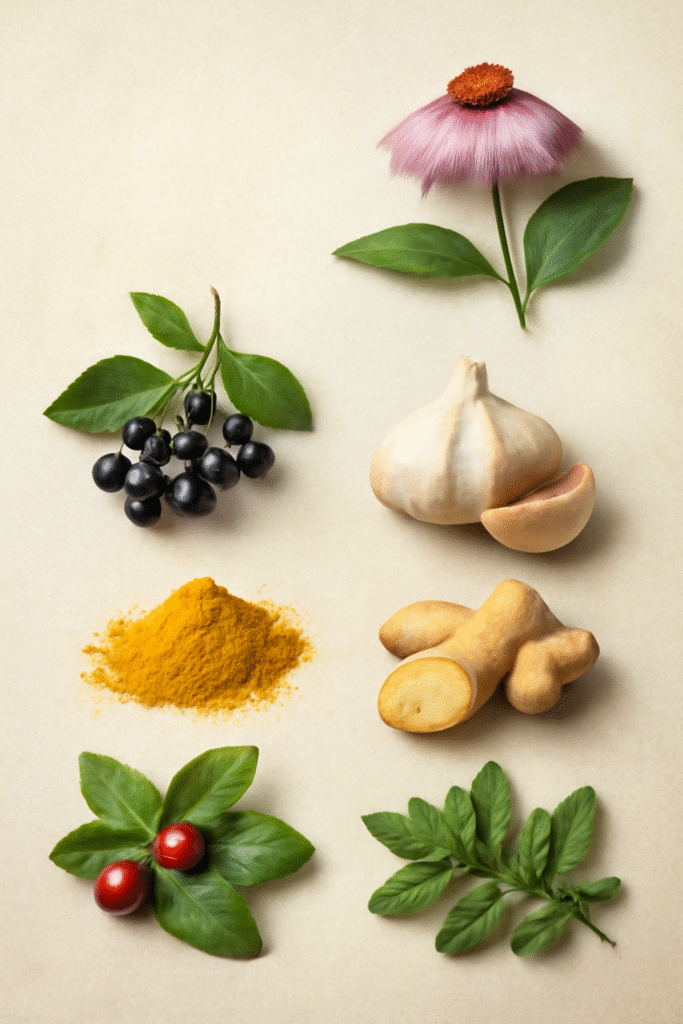In an age where health and wellness are paramount, many individuals are turning to nature’s own remedies to bolster their immune systems. Herbs have been used for centuries in various cultures for their medicinal properties, and science is increasingly backing these traditional uses. Let’s explore some of the top herbs known to enhance immune function and protect your body against illnesses.
1. Echinacea
Overview
Echinacea, also known as coneflower, is a herb that has gained popularity for its immune-boosting properties. Native to North America, it’s commonly used to prevent or treat respiratory infections.
How It Works
Echinacea is believed to stimulate the production of white blood cells, key players in the immune response. Studies show that it may reduce the duration and severity of colds.
Usage
Echinacea is available in various forms, including teas, capsules, and tinctures. For best results, start taking it at the onset of cold symptoms or as a preventive measure during flu season.
2. Elderberry
Overview
Elderberry, particularly the black elderberry (Sambucus nigra), has been used traditionally to ward off colds and influenza.
How It Works
Rich in antioxidants, elderberry fights inflammation and may inhibit the replication of certain viruses. Research suggests that elderberry syrup can shorten the duration of flu symptoms.
Usage
Elderberry can be consumed as a syrup, extract, or lozenge. It’s often advised to take it at the first sign of illness.
3. Garlic
Overview
Garlic (Allium sativum) is not just a culinary staple; it’s also a powerful herb with immune-boosting properties.
How It Works
Garlic contains allicin, a compound known for its antimicrobial and antiviral effects. It enhances the functioning of immune cells and has been shown to reduce the risk of colds and flu.
Usage
Fresh garlic is most potent, but it can also be taken in supplement form. Raw or lightly cooked garlic is considered most effective for health benefits.
4. Ginger
Overview
Ginger (Zingiber officinale) is celebrated for its anti-inflammatory and antioxidant properties.
How It Works
Ginger promotes circulation and may aid the body in combating infections. Its anti-inflammatory effects can help soothe sore throats and other respiratory issues.
Usage
Ginger can be consumed raw, as a tea, or in supplements. Adding it to your diet can provide both flavor and health benefits.
5. Turmeric
Overview
Turmeric, a golden spice derived from the Curcuma longa plant, is renowned for its anti-inflammatory and immunity-boosting properties, mainly due to its active compound, curcumin.
How It Works
Curcumin enhances immune function and reduces inflammation. Its antioxidant capabilities help protect cells from damage.
Usage
Turmeric can be added to food, smoothies, or taken as a supplement. Pairing it with black pepper can enhance curcumin absorption.
6. Ashwagandha
Overview
Ashwagandha (Withania somnifera), an adaptogenic herb, has been used in Ayurvedic medicine for centuries.
How It Works
This herb helps modulate the body’s stress response and promotes overall wellness, which is crucial for a robust immune system. Chronic stress can weaken immunity, making ashwagandha an invaluable ally.
Usage
Ashwagandha is available in capsule, powder, or tincture form. It may take a few weeks for the effects to be felt, so consistent use is recommended.
7. Oregano
Overview
Oregano (Origanum vulgare) is more than just a flavor enhancer; this herb boasts impressive antimicrobial properties.
How It Works
Thanks to compounds like carvacrol and thymol, oregano exhibits antiviral and antifungal effects, which can support immune health.
Usage
Oregano oil is a concentrated form that can be taken in drops or capsules. Fresh or dried oregano can also be included in your meals for added health benefits.
Conclusion
Harnessing the power of herbs can significantly bolster your immune system and provide a natural shield against infections. Incorporating these herbs into your daily routine can promote overall health and wellness. However, always consult with a healthcare provider before starting any new supplements, especially if you’re pregnant, nursing, or taking medications. Nature’s defenders are here to help, so embrace these powerful allies on your journey to better health!
SEO Suggestions for Links:
Inbound Links:
- Link to other relevant blog posts on your site about herbal medicine or natural wellness practices.
- Link to product pages for herbal supplements or immune-boosting teas.
Outbound Links:
- Healthline (Echinacea benefits): Healthline on Echinacea
- WebMD (Elderberry benefits): WebMD on Elderberry
- Mayo Clinic (Garlic benefits): Mayo Clinic on Garlic


